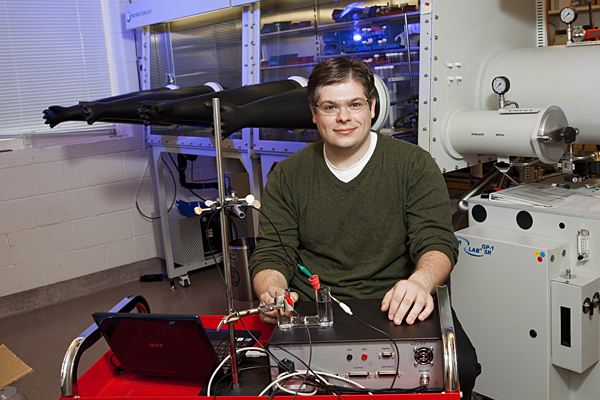
Dreyfus Award
UD's Rosenthal receives postdoctoral award in environmental chemistry
12:57 p.m., Nov. 20, 2013--Chemist Joel Rosenthal, whose work in renewable energy focuses on the use of solar energy to convert carbon dioxide into synthetic liquid fuels, has been awarded a highly competitive grant to add a postdoctoral researcher to his lab.
The assistant professor of chemistry at the University of Delaware has been selected to receive a Dreyfus Postdoctoral Award in Environmental Chemistry, which provides $120,000 to support a researcher for two years. This year’s award was given to eight scientists across the country, including researchers at the Massachusetts Institute of Technology and California Institute of Technology, where recipient Robert Grubbs is a 2005 Nobel laureate.
Honors Stories
National Medal of Science
Warren Award
“This is a very generous award, and it should allow us to attract a top postdoc — someone who can join the group and start making immediate contributions to our work,” Rosenthal said. His research group currently includes seven doctoral students, which he said is “a good number of people for the postdoc to work with and to mentor.”
About half of the researchers in his lab are working on a project involving bismuth, an inexpensive, nontoxic and plentiful — it’s an ingredient in Pepto-Bismol but has few other commercial uses — substance that Rosenthal said can be an affordable catalyst in making synthetic fuels. The bismuth research was published in June in the Journal of the American Chemical Society.
The research focuses on the difficult process of converting carbon dioxide into carbon monoxide, which is “incredibly energy-rich and a very valuable chemical commodity,” Rosenthal said. That high-energy carbon monoxide then becomes the main ingredient in making synthetic liquid fuel, with the promise of using that new substance to replace fossil fuels such as gasoline, diesel or jet fuel.
Scientists who have been converting carbon dioxide to carbon monoxide most commonly use gold or silver as a catalyst, but Rosenthal said bismuth — at a small fraction of the cost of those precious metals — is much more cost-effective. The idea, he said, is to take a free and renewable source of energy such as solar and use that energy with bismuth as a catalyst to convert the carbon dioxide into fuel.
Why store the energy in liquid fuel rather than batteries?
Rosenthal gives one example: The battery in your smart phone most likely needs recharging every day or so. If that battery were instead a container of the same size holding liquid fuel, your phone could operate for three weeks without interruption.
“Liquid fuel is just more useful for storage of energy within a small footprint,” he said. “The dream is to make that fuel from renewable sources — to power your car with sunlight.”
Rosenthal, who earned his doctorate in inorganic chemistry at MIT, joined the UD faculty in 2010. He received a Young Investigator Award from the American Chemical Society in 2007, a Ralph E. Powe Junior Faculty Enhancement Award from Oak Ridge Associated Universities in 2011 and a DuPont Young Professor Award in 2012.
Article by Ann Manser
Photo by Ambre Alexander








